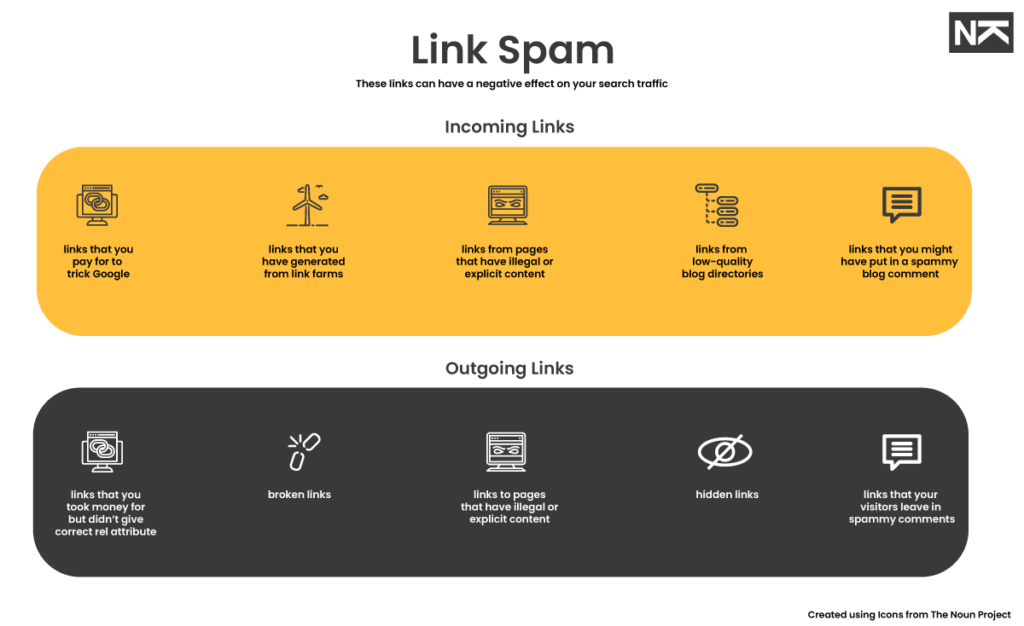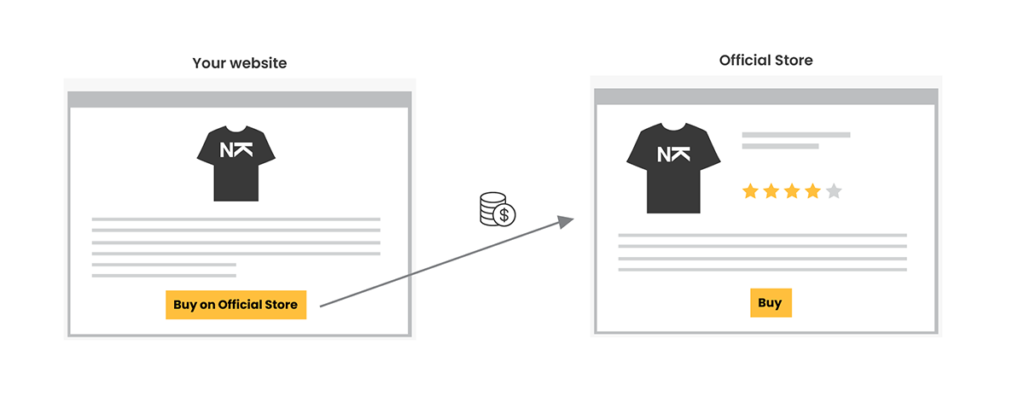If you’ve ever researched ways to optimise your website for improved Google rankings, then you already know how important backlinks are. There have been a number of Google Search Engine Algorithm Updates and changes but the importance of backlinks still remains undeterred.
We’ve even mentioned it in our Off-Page Optimisation Techniques blog post. The latest Google Search Engine algorithm updates have brought links back into the spotlight. A recent update by Google Search Central talks about the improvements in Google’s ranking systems to fight link spam.
This update is intended to examine the quality of outbound links in a website.
What are Outbound Links?
Outbound links are links that take the viewer from your website to some other website.
There are usually two types of links:
- Dofollow links: These links pass your website’s authority (Also called “link juice”) to the website that you’re linking to. These are considered to be regular links.
- Nofollow links: These links do not pass your website’s authority to the website that you’re linking to.
Google recommends publishers to use the correct rel(relation) values for especially those links that might have a commercial nature.
What is Link Spam?
Publishers can monitize their websites through numerous ways: Google Adsense, Affiliate Links or even Sponsored or Guest Posts. Google is not against publishers trying to monetise their websites but all the company wants is for publishers to use the correct rel attributes when linking to other content.
Many websites do excessive outbound linking without using the correct annotations. This goes against Google’s quality guidelines and can actually hamper a website’s Search Engine performance.

So what does Google want me to do?
As I mentioned before, the company does not want websites to not be able to monetize their websites. They just want these links to be well-deserved so that the end user gets the best experience possible.
All you as a publisher need to do is appropriately qualify any outgoing links from your website.
Google has provided few guidelines to help site owner properly manage links that have a commercial nature (involves payment or sponsorship).
Let’s go through these:
Affiliate Links
Affiliate links can be in form of product comparisons, shopping guides etc. One great example of a website making revenue through affiliate links is Thisiswhyimbroke. These websites usually list products sold on other websites along with some content. When the viewers of these websites click on the CTA present on these publisher’s websites they get redirected to the official store where they can purchase the product.

Monetizing your website using affiliate links is not a problem till the time you declare that these links are sponsored and you are earning money by putting these links on your website.
How do you declare this relationship?
Google asks websites to qualify these links with rel=”sponsored”.
For example,
I want to link to a tshirt available on the domain www.example.com
This is what my link will look like:
<a href="https://www.example.com" rel="sponsored">tshirt</a>Sponsored or Guest Posts
We have mentioned guest blogging in our Off-Page Optimisation blog post. Guest Posts are great for people who are looking to get more exposure and want to drive more traffic to their website. A lot of publishers monetize their websites by allowing others to submit guest or sponsored posts.

Google wants publishers to properly attribute these links using the sponsored rel value.
User Generated Content
If you have a blog on your website, you might have noticed that a lot of visitors leave spammy comments on the blog posts. Often these comments have links to other low-quality websites in them.
This type of spam comments can be extremely harmful to your website as they can lower the reputation of your website. These links can also direct users to malicious websites. Having low-quality outgoing links on some parts of your website can impact the overall ranking as well.
It is extremely important to monitor these spammy comments and properly qualify them with rel values so that Google does not use these links to calculate PageRank.
There are various ways to prevent these spam comments:
- Disable comments on your website.
- Enable moderation features on your blog – This feature prevents the comment from appearing on the website till you’ve approved it.
- Use Google reCaptcha to block spam comments.
- Use the “nofollow” or “ugc” rel values. (Note: UGC stands for User Generated Content)
For instance, at the end of your blog post a visitor leaves a comment with a hyperlink to some website. This is how it’ll normally look:
<a href="http://www.somelowqualitywebsite.com/">What a great article! Extremely helpful</a>You should convert the above comment to either
<a href="http://www.somelowqualitywebsite.com/" rel="nofollow">What a great article! Extremely helpful</a>or
<a href="http://www.somelowqualitywebsite.com/" rel="ugc">What a great article! Extremely helpful</a>This will inform Google to not take this link into consideration while calculating PageRank of your website.
If you’re using WordPress, you can use the UGC Comments plugin, to auto add the “nofollow” and “ugc” rel values to the comments.
Impact of the Link Spam Google Search Engine Algorithm Update
Google Search Engine Algorithm has become more effective in combating link spam over the years and the latest July 2021 update is just going to strengthen its ability to identify and nullify link spam across more websites and in multiple languages. It launched sometime around the first or second week of August.
Site owners that fail to qualify the links on their website will see changes in their Search rankings once their website is assessed by Google according to the updated algorithm.
So as always, if you’re currently working on your website’s SEO and even if you’re not, make sure that you are using appropriately tagged links. Once that’s done, there’s nothing that you have to worry about. Well, at least till Google thinks of something new!
